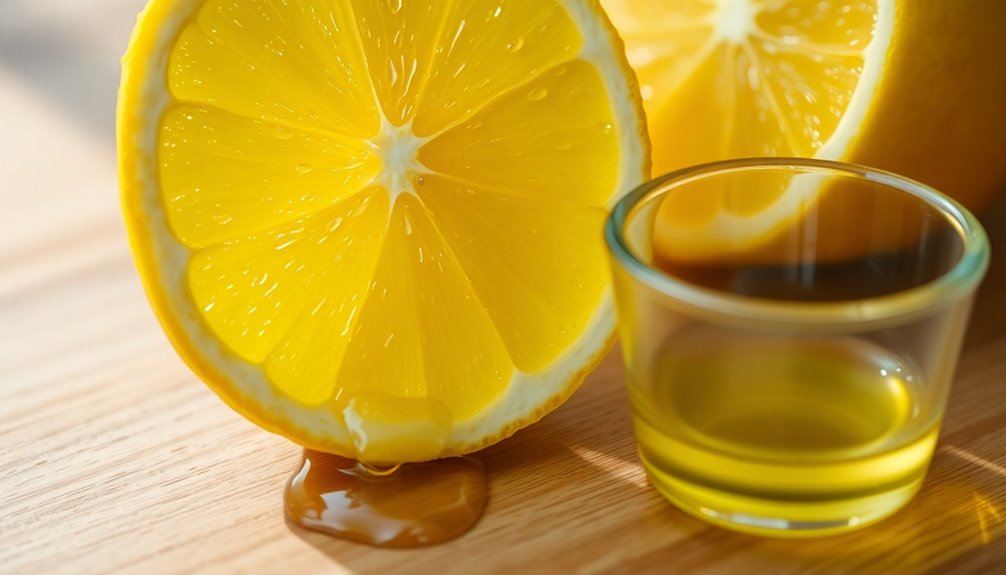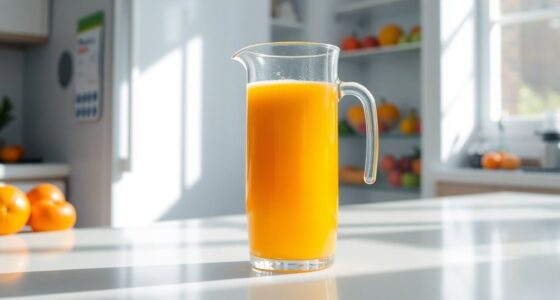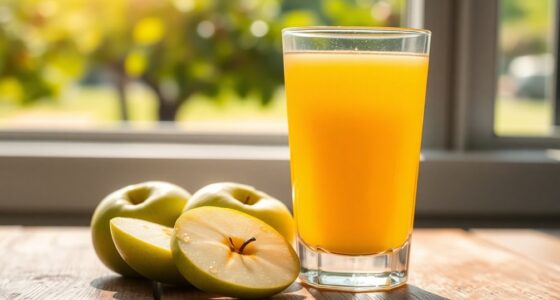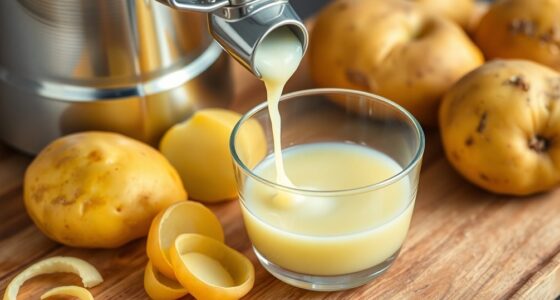A medium lemon yields about 3 tablespoons of juice. If you use a large lemon, you can get up to 4 tablespoons, while a smaller one typically provides around 2 tablespoons. Remember, the size and ripeness of the lemon can really impact how much juice you'll extract. It's handy to know this for your recipes. Stick around to discover more tips on measuring and using lemon juice effectively in your cooking!
Key Takeaways
- A medium lemon typically yields about 3 tablespoons of juice.
- A large lemon can yield up to 4 tablespoons or a quarter cup.
- Smaller lemons may yield around 2 tablespoons of juice.
- Juice yield can vary based on the lemon's size and ripeness.
- Meyer lemons are generally smaller and yield less juice compared to regular lemons.
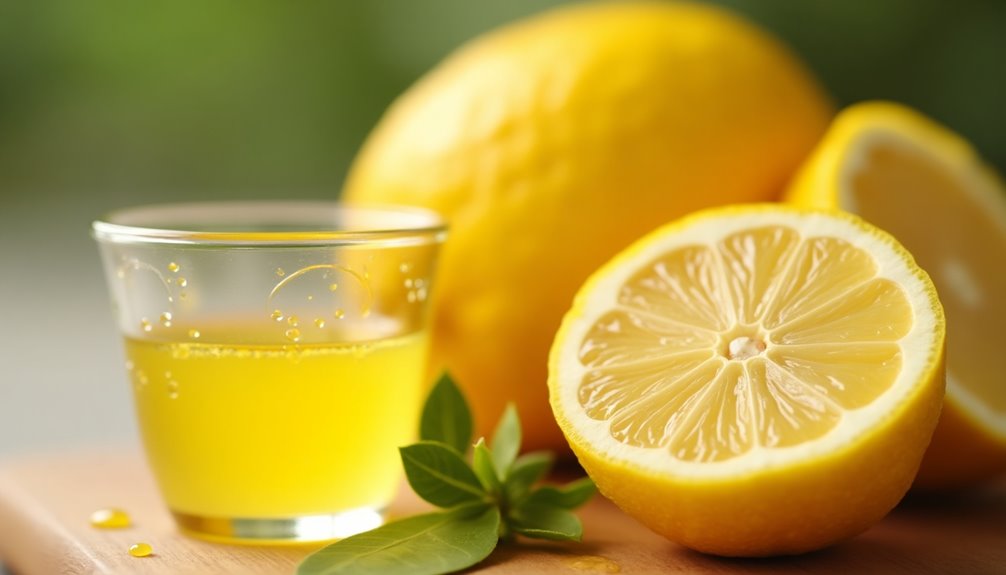
When you squeeze a medium lemon, you can expect to get about 3 tablespoons of juice. This amount of juice can vary depending on a few factors, including the lemon's size and ripeness. If you happen to grab a large lemon, you might be pleasantly surprised to find that it yields up to 4 tablespoons of juice, or even a quarter cup! On the other hand, if you pick a smaller lemon, you may only get around 2 tablespoons of juice, which can be a bit disappointing if you're relying on it for your favorite recipes.
When you're cooking or baking, knowing how much juice is in a lemon helps you plan your ingredient quantities more effectively. If you're aiming for a specific amount of lemon juice, it's good to remember that, on average, you'll need about 5.25 to 5.5 medium lemons to get a full cup of lemon juice. This means if you're preparing a big batch of lemonade or a tangy lemon sauce, it's best to have a few extra lemons handy.
One handy tool for extracting every last drop of juice is a citrus juicer. Whether you opt for a manual juicer or an electric one, it can make the process much easier. Just cut the lemon in half, place it in the juicer, and press down. You'll be amazed at how much juice you can extract with minimal effort. Using a citrus juicer can really maximize the amount of juice you get from your lemons.
If you decide to use Meyer lemons instead of regular lemons, you might notice a slight difference in the juice yield. Meyer lemons are typically sweeter and less acidic, but they're also smaller, which means they mightn't yield as much juice overall. When you juice a lemon, it's essential to keep these differences in mind, especially if you're following a recipe that calls for a specific type of lemon.
For those wondering about the total yield from a pound of lemons, you can generally expect to find about 4 to 5 lemons in a pound. This should give you approximately 12 to 15 tablespoons of juice, which equals about 3/4 cup to a full cup. Knowing these figures can help you plan your grocery shopping better, so you don't end up with too few lemons when you need them.
Finally, remember that the ripeness and seasonality of lemons can affect their juice yield. If you're using lemons that are in season and perfectly ripe, you're likely to get the most juice. So, the next time you need lemon juice for a recipe, keep these details in mind. With a little knowledge about how much juice to expect from one lemon, you'll be well-equipped to make your culinary creations shine.
Frequently Asked Questions
Can I Substitute Bottled Lemon Juice for Fresh Lemon Juice?
Yes, you can substitute bottled lemon juice for fresh lemon juice, but keep in mind that the flavor may differ.
If a recipe calls for fresh juice, using bottled mightn't give you the same brightness and aroma. Generally, you can use about 1 tablespoon of bottled juice for each medium lemon.
However, for the best results, especially in dishes where flavor is key, fresh juice is often the better choice.
Is 100% Lemon Juice in a Bottle the Same as a Lemon?
Imagine biting into a sun-kissed lemon, its juice bursting forth with vibrant flavor.
But is 100% lemon juice in a bottle the same? Not quite.
Bottled juice often lacks the fresh taste and aroma you'd expect from a real lemon, and it may have preservatives that alter its flavor.
While it can work in a pinch, you'll find that the freshness and acidity of a real lemon simply can't be replicated.
How Much Real Lemon Juice Is Equal to a Lemon?
When you're comparing real lemon juice to an actual lemon, you'll find that a medium lemon usually gives you about 3 tablespoons of juice.
So, if a recipe calls for lemon juice, you can use this measure to substitute real lemon juice.
Keep in mind that larger lemons can yield up to 4 tablespoons, so adjusting your quantity based on size might be necessary for the best results in your dishes.
How Much Lemon Juice Concentrate Equals One Lemon?
Think of lemon juice concentrate as a magic potion that packs a zesty punch!
To replace the juice of one medium lemon, you'll need about 2 tablespoons of concentrate. However, remember that the flavor can be stronger than fresh juice, so adjust to your taste.
Always check the packaging for specifics, as each brand's potency can vary.
With a little experimentation, you'll find the perfect balance for your dishes!
Conclusion
So, next time you slice open a lemon, picture the bright yellow juice bursting forth, ready to awaken your taste buds. With about 2 to 3 tablespoons of that zesty liquid in a single lemon, you've got the perfect ingredient to elevate any dish. Whether you're brightening up a salad or adding a splash to your drink, the tangy essence of lemon juice can transform the ordinary into the extraordinary, like sunshine breaking through a cloudy day.
Cindy thoroughly researches juicing trends, techniques, and recipes to provide readers with practical advice and inspiration. Her writing style is accessible, engaging, and designed to make complex concepts easy to understand. Cindy’s dedication to promoting the advantages of juicing shines through her work, empowering readers to make positive changes in their lives through the simple act of juicing.

